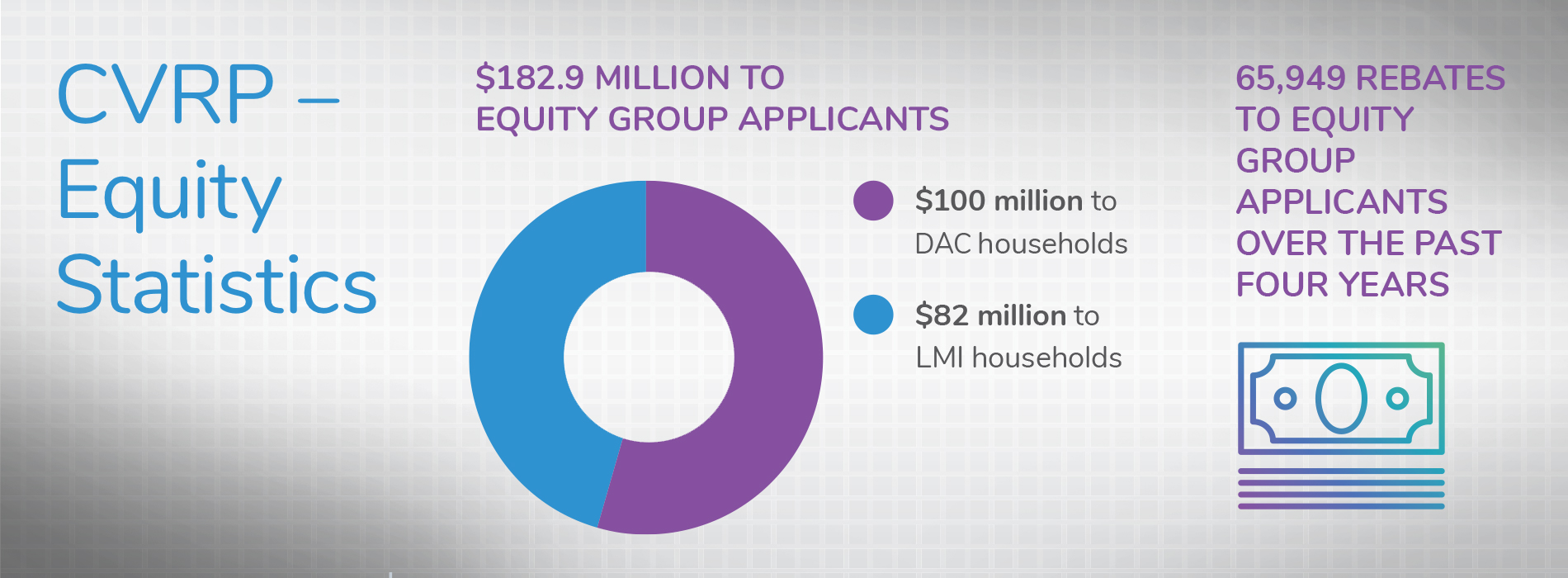

Clean Vehicle Rebate Project dedicates additional $25M for low- and moderate-income households, expands access in the San Joaquin Valley
Contacts
Melanie Turner, California Air Resources Board
Chuck Colgan, Center for Sustainable Energy
SAN DIEGO, CA (Feb. 23, 2021) – As California continues to lead the nation in spurring electric vehicle (EV) adoption, the California Air Resources Board (CARB) is making more clean vehicle rebates available for lower-income consumers.
A cornerstone of CARB’s suite of EV-purchase incentives, the Clean Vehicle Rebate Project (CVRP) is the nation’s largest and longest-running EV incentive program. CVRP offers standard rebates of $1,000 to $4,500 for the purchase or lease of a new eligible plug-in hybrid or zero-emission vehicle. An additional $2,500 rebate is available to low- and moderate-income households at or below 400 percent of the federal poverty level.
“By making sure lower-income families continue to have access to this incentive funding, we help to ensure that more California drivers, especially those living in communities most impacted by air pollution, can benefit from driving and owning the cleanest vehicles,” CARB Executive Officer Richard W. Corey said. “And more zero- and near-zero-emission vehicles on our roads means cleaner air for all Californians.”
CVRP set aside $25 million for the $2,500 increased rebates for low- and moderate-income households for Fiscal Year 2019-20. That allocation was exhausted on Feb. 5, 2021. To continue support for new EV purchases and leases by low- and moderate-income car shoppers, CARB is dedicating an additional $25 million, or half of the remaining CVRP funds, to ensure that the $2,500 increased rebates remain funded into fall 2021.
According to data compiled by CVRP administrator Center for Sustainable Energy, the program has awarded 65,949 rebates to low- and moderate-income Californians and those living in disadvantaged and low-income communities over the past four years.
Since 2016, when CVRP instituted income caps for applicants and created increased rebates for lower income-qualified consumers, 34 percent of rebate funding, or $182.9 million, has gone to lower-income applicants and those living in disadvantaged communities. The percentage grew last year to 38 percent.
Essential to CVRP’s efforts to reach out to diverse communities statewide is a team of multilingual equity specialists and a Community Partners Network of 28 community-based organizations.
Rebate Now
To accelerate consumer EV adoption, CVRP also is expanding its Rebate Now program, which allows qualifying low- and moderate-income car shoppers to get their rebate at the showroom instead of waiting for a check in the mail. They can prequalify online, then use their rebate as a down payment at the point of sale or lease. CVRP Rebate Now has been available for three years in San Diego County as a pilot program and in April will extend into eight counties in the San Joaquin Valley, with a specific focus of providing rebates to lower-income car shoppers.
“While California has always been an environmental leader, we need to do more to grow EV ownership if the state is going to meet its goal of 5 million zero-emission vehicles by 2030,” said Jonathan Changus, director of California Transportation Programs at the Center for Sustainable Energy. “By expanding access to increased rebates and offering prequalified rebates that can be applied at the dealership, CVRP can boost EV sales and ensure more Californians can enjoy the health and economic benefits of emission-free vehicles.”
Low- and moderate-income consumers may also qualify for CARB’s other clean transportation equity programs, including Clean Cars 4 All, which offers up to $9,500 for scrapping an older car and replacing it with an EV, and the Clean Vehicle Assistance Program, which offers grants of up to $5,000 to pay for a plug-in EV and access to affordable financing. In November 2020, CARB also instituted the California Clean Fuel Reward program that offers all EV purchasers up to $1,500 off the vehicle cost at the point of sale.
Initiated in 2010, CVRP has awarded over 401,900 rebates totaling more than $918,396,700. Nearly 65% of all EVs on California roadways received a CVRP incentive. More details are available on the program website cleanvehiclerebate.org/rebate-statistics.
# # #
About the Center for Sustainable Energy
The Center for Sustainable Energy® (CSE) is a nonprofit offering clean energy program administration and technical advisory services. With the experience and streamlined efficiency of a for-profit operation, CSE leads with the passion and heart of a nonprofit. We work nationwide with energy policymakers, regulators, public agencies, businesses and others as an expert implementation partner and trusted resource. EnergyCenter.org.
About the California Air Resources Board (CARB)
CARB's mission is to promote and protect public health, welfare, and ecological resources through effective reduction of air pollutants while recognizing and considering effects on the economy. CARB is the lead agency for climate change programs and oversees all air pollution control efforts in California to attain and maintain health-based air quality standards. ww2.arb.ca.gov

